学术英语读写教程下册unit2
21世纪大学英语读写教程第2册全文

21世纪大学英语读写教程第2册全文Unit 1 My HometownPart 1 Listening PracticeExercise 1Track 1-1Instructions: You will hear a conversation between two friends, talking about their hometowns. Listen carefully and answer the following questions.1.Where is Mary’s hometown?2.What is the population of Mary’s hometown?3.How long does it take to get to Mary’s hometownfrom the city?4.What is the local specialty in Mary’s hometown?5.What does Mary recommend the listener do if theyvisit her hometown?Exercise 2Track 1-2Instructions: You will hear a monologue about a famous city. Listen carefully and complete the sentences with the missing information.1.The city is known for its _______ architecture.2.The city has _______ districts.3.The city’s most famous attraction is _______.4.Visitors can enjoy _______ performances in the city.5.The speaker recommends visiting _______ for abeautiful view of the city.Part 2 SpeakingExercise 1Instructions: Work in pairs. Answer the following questions about your hometown, using the prompts given.1.Where is your hometown?2.What is the population of your hometown?3.How long does it take to get to your hometown fromthe city?4.What is the local specialty in your hometown?5.What do you recommend visitors to do if they visityour hometown?Exercise 2Instructions: In pairs, discuss the following questions abouta famous city.1.Which city would you like to visit? Why?2.What do you know about the city?3.What attractions does the city have?4.What activities would you like to do in the city?5.What would you recommend others to do if theyvisit the city?Part 3 ReadingPassage 1Instructions: Read the following passage about the history of London and answer the questions that follow.London, the capital city of England, has a rich history dating back to Roman times. The city was founded by the Romans in AD 43 and was originally called Londinium. It quickly became an important trading port and grew in prosperity.During the Middle Ages, London saw significant growth and became the largest city in England. It played a major role in the development of the British Empire and was a center of political, economic, and cultural power.Today, London is a global city and a major tourist destination. It is known for its iconic landmarks such as the Tower of London, Buckingham Palace, and the British Museum. Visitors can also enjoy world-class shopping, theaters, and cuisine.1.When was London founded by the Romans?2.What was London originally called?3.What role did London play during the Middle Ages?4.What are some famous landmarks in London?Passage 2Instructions: Read the following passage about a famous city in Asia and answer the questions that follow.Tokyo, the capital city of Japan, is a modern metropolis with a unique blend of traditional and contemporary culture. The city is known for its bustling streets, futuristic technology, and vibrant entertainment industry.Tokyo has a rich history and was originally a small fishing village called Edo. It became the capital of Japan in 1868 andgrew rapidly during the Meiji period, when Japan opened up to the world.Today, Tokyo is one of the most populous cities in the world and a major economic and cultural hub. It is home to various attractions such as the Tokyo Tower, Imperial Palace, and Shibuya Crossing. Visitors can also experience traditional Japanese culture by visiting temples, enjoying Japanese cuisine, and witnessing traditional performances.1.What was Tokyo originally called?2.When did Tokyo become the capital of Japan?3.What is Tokyo known for today?4.What are some famous attractions in Tokyo?Unit 2 Environmental ProtectionPart 1 Listening PracticeExercise 1Track 2-1Instructions: You will hear a conversation between a student and a professor, discussing environmental issues. Listen carefully and answer the following questions.1.What is the main topic of the conversation?2.How does climate change affect ecosystems?3.What are some causes of deforestation?4.What are the consequences of air pollution?5.What can individuals do to help protect theenvironment?Exercise 2Track 2-2Instructions: You will hear a monologue about recycling. Listen carefully and complete the sentences with the missing information.1.Recycling helps reduce the _______ of waste.2._______ is a commonly recycled material.3.Recycling _______ helps conserve natural resources.4.The speaker suggests _______ as a way to reducewaste.5.It is important to _______ before recycling materials.Part 2 SpeakingExercise 1Instructions: Work in pairs. Answer the following questions about environmental issues, using the prompts given.1.What environmental issues are you concerned about?2.What are some causes of these issues?3.What are the consequences of these issues?4.What can individuals do to help protect theenvironment?5.How can governments and organizations contributeto environmental protection?Exercise 2Instructions: In pairs, discuss the following questions about recycling.1.How often do you recycle?2.What types of materials do you recycle?3.Why do you think recycling is important?4.Have you ever participated in any recyclingprograms or initiatives?5.What can schools and communities do to promote recycling?。
21世纪大学英语读写教程2reading aloud
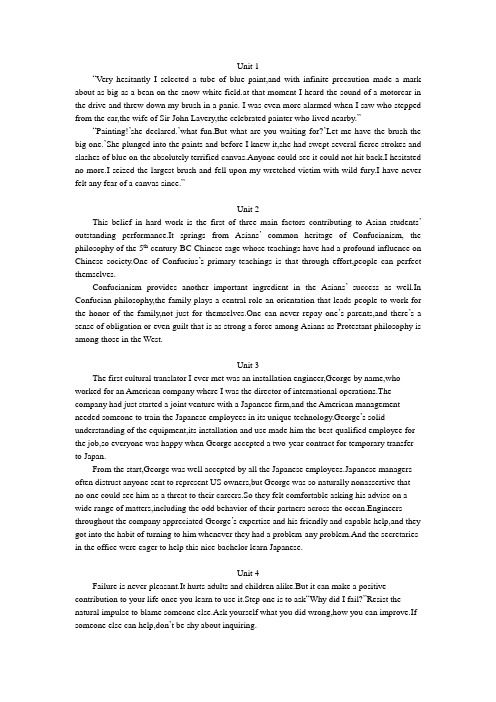
Unit 1“Very hesitantly I selected a tube of blue paint,and with infinite precaution made a mark about as big as a bean on the snow-white field.at that moment I heard the sound of a motorcar in the drive and threw down my brush in a panic. I was even more alarmed when I saw who stepped from the car,the wife of Sir John Lavery,the celebrated painter who lived nearby.”“Painting!’she declared.’what fun.But what are you waiting for?’Let me have the brush-the big one.’She plunged into the paints and before I knew it,she had swept several fierce strokes and slashes of blue on the absolutely terrified canvas.Anyone could see it could not hit back.I hesitated no more.I seized the largest brush and fell upon my wretched victim with wild fury.I have never felt any fear of a canvas since.”Unit 2This belief in hard work is the first of three main factors contributing to Asian students’outstanding performance.It springs from Asians’common heritage of Confucianism, the philosophy of the 5th-century-BC Chinese sage whose teachings have had a profound influence on Chinese society.One of Confucius’s primary teachings is that through effort,people can perfect themselves.Confucianism provides another important ingredient in the Asians’success as well.In Confucian philosophy,the family plays a central role-an orientation that leads people to work for the honor of the family,not just for themselves.One can never repay one’s parents,and there’s a sense of obligation or even guilt that is as strong a force among Asians as Protestant philosophy is among those in the West.Unit 3The first cultural translator I ever met was an installation engineer,George by name,who worked for an American company where I was the director of international operations.The company had just started a joint venture with a Japanese firm,and the American management needed someone to train the Japanese employees in its unique technology.George’s solid understanding of the equipment,its installation and use made him the best-qualified employee for the job,so everyone was happy when George accepted a two-year contract for temporary transfer to Japan.From the start,George was well accepted by all the Japanese employees.Japanese managers often distrust anyone sent to represent US owners,but George was so naturally nonassertive that no one could see him as a threat to their careers.So they felt comfortable asking his advise on a wide range of matters,including the odd behavior of their partners across the ocean.Engineers throughout the company appreciated George’s expertise and his friendly and capable help,and they got into the habit of turning to him whenever they had a problem-any problem.And the secretaries in the office were eager to help this nice bachelor learn Japanese.Unit 4Failure is never pleasant.It hurts adults and children alike.But it can make a positive contribution to your life once you learn to use it.Step one is to ask“Why did I fail?”Resist the natural impulse to blame someone else.Ask yourself what you did wrong,how you can improve.If someone else can help,don’t be shy about inquiring.Success,which encourages repetition of old behavior,is not nearly as good a teacher as failure.You can learn from a disastrous party how to give a good one,from an ill-chosen first house what to look for in a second.Even a failure that seems total can prompt fresh thinking,a change of direction.Unit 8When you’re eating among other people,you don’t raise your voice;it’s just one example of the unwritten rules we live by.When you consider it,you recognize that those rules probably govern our lives on a more absolute basis than the ones you could find if you looked in the law books.The customs that govern us are what make a civilization.There would be chaos without them,and yet it’s not at all clear why-even in our disintegrating society-we obey them.How many times have you stopped at a red light late at night?You can see in all directions;there’s no one else around-no headlights,no police cruise idling behind you.You’re tired and in a hurry.But you wait for the light to change.Is it for safety’s sake?No;you can see that there would be no accident if you drove on.Is it to avoid getting arrested?No;you are alone;there’s no one to catch you.Still,you sit and wait.。
新视野大学英语第三版读写教程第二册课文翻译(全)

新视野大学英语第二册读写教程课文翻译Unit 1 Text A An impressive English Lesson标题: 一堂难忘的英语课1. 如果我是唯一一个还在纠正小孩英语的家长,那么我儿子也许是对的。
对他而言,我是一个乏味的怪物:一个他不得不听其教诲的父亲,一个还沉湎于语法规则的人,对此我儿子似乎颇为反感。
2. 我觉得我是在最近偶遇我以前的一位学生时,才开始对这个问题认真起来的。
这个学生刚从欧洲旅游回来。
我满怀着诚挚期待问她:“欧洲之行如何?”3. 她点了三四下头,绞尽脑汁,苦苦寻找恰当的词语,然后惊呼:“真是,哇!”4. 没了。
所有希腊文明和罗马建筑的辉煌居然囊括于一个浓缩的、不完整的语句之中!我的学生以“哇!”来表示她的惊叹,我只能以摇头表达比之更强烈的忧虑。
5. 关于正确使用英语能力下降的问题,有许多不同的故事。
学生的确本应该能够区分诸如their/there/they're 之间的不同,或区别complimentary 跟complementary 之间显而易见的差异。
由于这些知识缺陷,他们承受着大部分不该承受的批评和指责,因为舆论认为他们应该学得更好。
6. 学生并不笨,他们只是被周围所看到和听到的语言误导了。
举例来说,杂货店的指示牌会把他们引向stationary(静止处),虽然便笺本、相册、和笔记本等真正的stationery (文具用品)并没有被钉在那儿。
朋友和亲人常宣称They've just ate。
实际上,他们应该说They've just eaten。
因此,批评学生不合乎清理。
7. 对这种缺乏语言功底而引起的负面指责应归咎于我们的学校。
学校应对英语熟练程度制定出更高的标准。
可相反,学校只教零星的语法,高级词汇更是少之又少。
还有就是,学校的年轻教师显然缺乏这些重要的语言结构方面的知识,因为他们过去也没接触过。
学校有责任教会年轻人进行有效的语言沟通,可他们并没把语言的基本框架一一准确的语法和恰当的词汇一一充分地传授给学生。
大学英语读写综合教程2.课件Uni
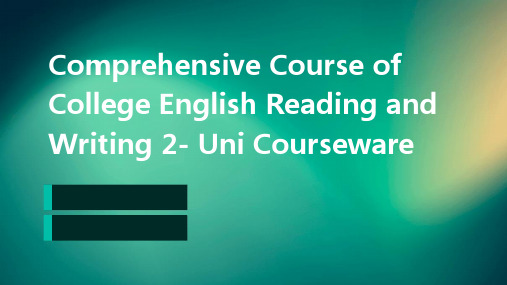
Course outline
Unit 1
Critical Thinking and Argumentation
Reading assignments
Selected essays on different topics, focusing on critical thinking and argumentation.
Case studies and reports on business English, focusing on professional writing and communication.
Writing assignments
Business letters, emails, and reports, practicing professional writing skills.
02 Language knowledge and skills
reading comprehension
提升阅读理解能力
通过阅读各种类型的英文文章,如新闻报道、小说、议论文等,学生可以提升阅 读理解能力,包括理解文章主旨、细节、推理和批判性思维能力。
Writing skills
提升写作表达能力
• Increase language proficiency: This course aims to enhance students' language proficiency in both written and spoken English, preparing them for further academic studies or professional work.
Online resources
There are many online resources available for learning English, including language exchange platforms, online courses, and language learning apps.
新视野大学英语读写教程(第三版)Book2-unit2-课文原文及翻译

新视野大学英语读写教程(第三版)Book2-unit2-课文原文及翻译Text A课文 AThe humanities: Out of date?人文学科:过时了吗?When the going gets tough, the tough takeaccounting. When the job market worsens, manystudent s calculate they can't major in English orhistory. They have to study something that booststheir pr ospects of landing a job.当形势变得困难时,强者会去选学会计。
当就业市场恶化时,许多学生估算着他们不能再主修英语或历史。
他们得学一些能改善他们就业前景的东西。
The data show that as students have increasingly shouldered the ever-rising cost of tuition,they ha ve defected from the study of the humanities and toward applied science and "hard"skills that they bet will lead to employment. In other words, a college education is more andmore seen as a mean s for economic betterment rather than a means for human betterment.This is a trend that is likely t o persist and even accelerate.数据显示,随着学生肩负的学费不断增加,他们已从学习人文学科转向他们相信有益于将来就业的应用科学和“硬”技能。
新视野大学英语第三版读写教程第二册课文翻译(全)
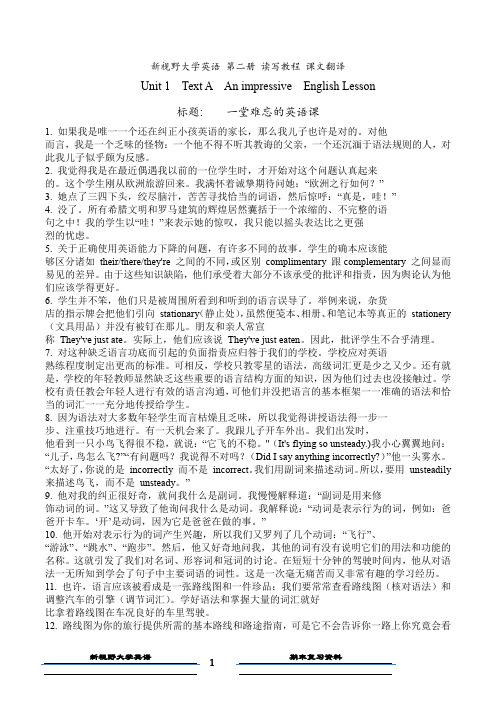
新视野大学英语第二册读写教程课文翻译Unit 1 Text A An impressive English Lesson标题: 一堂难忘的英语课1. 如果我是唯一一个还在纠正小孩英语的家长,那么我儿子也许是对的。
对他而言,我是一个乏味的怪物:一个他不得不听其教诲的父亲,一个还沉湎于语法规则的人,对此我儿子似乎颇为反感。
2. 我觉得我是在最近偶遇我以前的一位学生时,才开始对这个问题认真起来的。
这个学生刚从欧洲旅游回来。
我满怀着诚挚期待问她:“欧洲之行如何?”3. 她点了三四下头,绞尽脑汁,苦苦寻找恰当的词语,然后惊呼:“真是,哇!”4. 没了。
所有希腊文明和罗马建筑的辉煌居然囊括于一个浓缩的、不完整的语句之中!我的学生以“哇!”来表示她的惊叹,我只能以摇头表达比之更强烈的忧虑。
5. 关于正确使用英语能力下降的问题,有许多不同的故事。
学生的确本应该能够区分诸如their/there/they're 之间的不同,或区别complimentary 跟complementary 之间显而易见的差异。
由于这些知识缺陷,他们承受着大部分不该承受的批评和指责,因为舆论认为他们应该学得更好。
6. 学生并不笨,他们只是被周围所看到和听到的语言误导了。
举例来说,杂货店的指示牌会把他们引向stationary(静止处),虽然便笺本、相册、和笔记本等真正的stationery (文具用品)并没有被钉在那儿。
朋友和亲人常宣称They've just ate。
实际上,他们应该说They've just eaten。
因此,批评学生不合乎清理。
7. 对这种缺乏语言功底而引起的负面指责应归咎于我们的学校。
学校应对英语熟练程度制定出更高的标准。
可相反,学校只教零星的语法,高级词汇更是少之又少。
还有就是,学校的年轻教师显然缺乏这些重要的语言结构方面的知识,因为他们过去也没接触过。
学校有责任教会年轻人进行有效的语言沟通,可他们并没把语言的基本框架一一准确的语法和恰当的词汇一一充分地传授给学生。
新视野大学英语读写教程(第三版)第二册课文原文及翻译
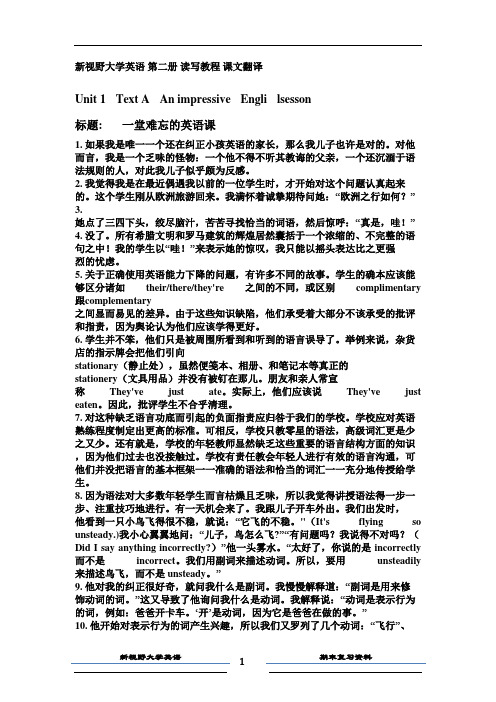
新视野大学英语第二册读写教程课文翻译Unit 1 Text A An impressive Engli lsesson标题: 一堂难忘的英语课1. 如果我是唯一一个还在纠正小孩英语的家长,那么我儿子也许是对的。
对他而言,我是一个乏味的怪物:一个他不得不听其教诲的父亲,一个还沉湎于语法规则的人,对此我儿子似乎颇为反感。
2. 我觉得我是在最近偶遇我以前的一位学生时,才开始对这个问题认真起来的。
这个学生刚从欧洲旅游回来。
我满怀着诚挚期待问她:“欧洲之行如何?”3.她点了三四下头,绞尽脑汁,苦苦寻找恰当的词语,然后惊呼:“真是,哇!”4. 没了。
所有希腊文明和罗马建筑的辉煌居然囊括于一个浓缩的、不完整的语句之中!我的学生以“哇!”来表示她的惊叹,我只能以摇头表达比之更强烈的忧虑。
5. 关于正确使用英语能力下降的问题,有许多不同的故事。
学生的确本应该能够区分诸如their/there/they're 之间的不同,或区别complimentary 跟complementary之间显而易见的差异。
由于这些知识缺陷,他们承受着大部分不该承受的批评和指责,因为舆论认为他们应该学得更好。
6. 学生并不笨,他们只是被周围所看到和听到的语言误导了。
举例来说,杂货店的指示牌会把他们引向stationary(静止处),虽然便笺本、相册、和笔记本等真正的stationery(文具用品)并没有被钉在那儿。
朋友和亲人常宣称They've just ate。
实际上,他们应该说They've just eaten。
因此,批评学生不合乎清理。
7. 对这种缺乏语言功底而引起的负面指责应归咎于我们的学校。
学校应对英语熟练程度制定出更高的标准。
可相反,学校只教零星的语法,高级词汇更是少之又少。
还有就是,学校的年轻教师显然缺乏这些重要的语言结构方面的知识,因为他们过去也没接触过。
学校有责任教会年轻人进行有效的语言沟通,可他们并没把语言的基本框架一一准确的语法和恰当的词汇一一充分地传授给学生。
大学英语读写教程2英汉翻译
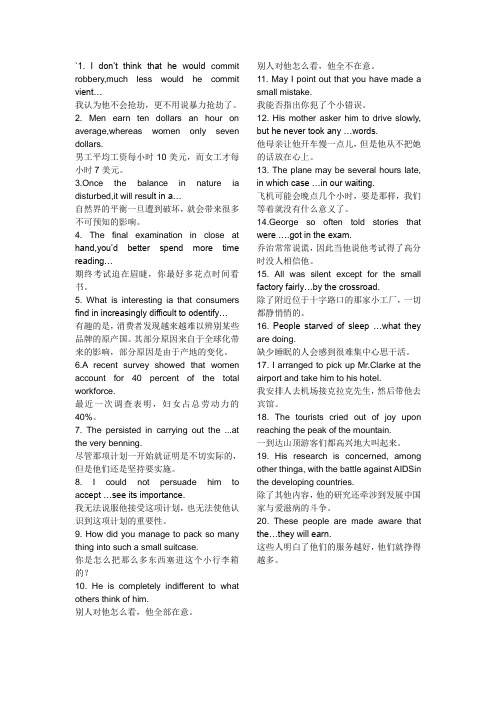
`1. I don’t think that he would commit robbery,much less would he commit vient…我认为他不会抢劫,更不用说暴力抢劫了。
2. Men earn ten dollars an hour on average,whereas women only seven dollars.男工平均工资每小时10美元,而女工才每小时7美元。
3.Once the balance in nature ia disturbed,it will res ult in a…自然界的平衡一旦遭到破坏,就会带来很多不可预知的影响。
4. The final examination in close at hand,you’d better spend more time reading…期终考试迫在眉睫,你最好多花点时间看书。
5. What is interesting ia that consumers find in increasingly difficult to odentify…有趣的是,消费者发现越来越难以辨别某些品牌的原产国。
其部分原因来自于全球化带来的影响,部分原因是由于产地的变化。
6.A recent survey showed that women account for 40 percent of the total workforce.最近一次调查表明,妇女占总劳动力的40%。
7. The persisted in carrying out the ...at the very benning.尽管那项计划一开始就证明是不切实际的,但是他们还是坚持要实施。
8. I could not persuade him toa ccept …see its importance.我无法说服他接受这项计划,也无法使他认识到这项计划的重要性。
9. How did you manage to pack so many thing into such a small suitcase.你是怎么把那么多东西塞进这个小行李箱的?10. He is completely indifferent to what others think of him. 别人对他怎么看,他全不在意。
- 1、下载文档前请自行甄别文档内容的完整性,平台不提供额外的编辑、内容补充、找答案等附加服务。
- 2、"仅部分预览"的文档,不可在线预览部分如存在完整性等问题,可反馈申请退款(可完整预览的文档不适用该条件!)。
- 3、如文档侵犯您的权益,请联系客服反馈,我们会尽快为您处理(人工客服工作时间:9:00-18:30)。
学术英语读写教程下册unit2 Unit 2 of the Academic English Reading and Writing Tutorial focuses on the topic of culture and identity. This unit introduces students to the concept of culture, its impact on individual and collective identity, and how these concepts are explored and analyzed through academic texts. The unit also provides students with strategies for effective reading and writing practices.
To start, the unit begins by offering an overview of what culture is and why it is important. Students are encouraged to think critically about the definition of culture and its different dimensions, including beliefs, customs, values, and artifacts. The unit emphasizes the significance of understanding cultural diversity and its role in shaping individuals and societies.
Next, students are guided through various academic texts that delve into different aspects of culture and identity. These texts range from scholarly articles and case studies to personal narratives and cultural analyses. Each reading is accompanied by comprehension questions and critical thinking exercises, encouraging students to engage with the materials and develop their analytical skills.
In addition to reading, the unit also focuses on developing students' writing skills. Students are introduced to the structure and components of an academic essay, including the introduction, body paragraphs, and conclusion. They are taught how to effectively organize their ideas and support their arguments with evidence from the texts.
Furthermore, the unit emphasizes the importance of critical thinking and academic integrity. Students are encouraged to evaluate the credibility and reliability of sources, and to properly cite and reference any information they use in their own writing. This promotes academic integrity and helps students develop their research skills.
Throughout the unit, students are provided with exercises and activities that help reinforce the concepts and skills they have learned. These activities include group discussions, brainstorming sessions, and peer editing exercises. The unit also includes a variety of vocabulary-building exercises, helping students expand their academic vocabulary related to culture and identity.
Overall, Unit 2 of the Academic English Reading and Writing Tutorial offers students a comprehensive understanding of culture and identity and equips them with essential reading and writing strategies. By engaging with a variety of academic texts, students are able to develop their critical thinking skills, expand their academic vocabulary, and strengthen their ability to communicate their ideas effectively in writing.。
